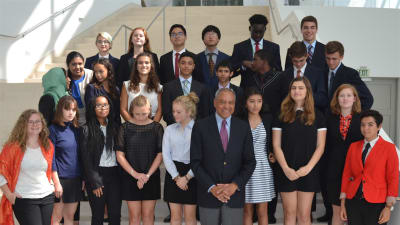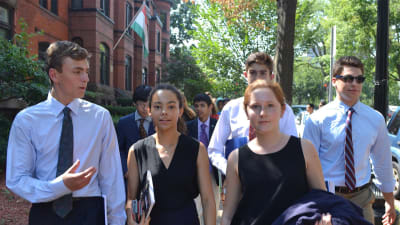Week Two: Lessons from Rwanda
Watching the 2004 PBS Frontline documentary Ghosts of Rwanda is an SEGL tradition. Since our first semester, the powerfully evocative film has captivated, alarmed, and inspired our students. What is the ethical response to mass atrocity? Should American leaders prioritize American interests at all times, or is it worth risking American lives to help stave off widespread havoc? How do we prevent these events from ever occurring? Ghosts, and our second case study of the semester, poses these questions.
On Tuesday evening we watched the documentary in our West dormitory common room. The discussion that followed was thoughtful, tearful, and forward-looking, and continued into dorm rooms long into the night.
Three of the leaders featured in the documentary are longtime SEGL guest speakers, and we met with two of them on Wednesday.
Carl Wilkens is a former Adventist missionary who was the head of his church’s relief mission in Rwanda during the genocide. He was the only American to stay behind in 1994, and is most well-known for (among other acts) saving an entire orphanage from Interahamwe machetes. To SEGL graduates, he is a winner of our coveted “Golden Mug” award, which our graduates give to the speaker who has made the biggest difference in their lives. (Carl is also an honorary SEGL teacher; twice he has co-led a group of our students to Rwanda. To learn more about our 2015 trip–we will almost certainly return–visit our SEGL in Rwanda page!)
Wilkens videoconferenced from the road (he plans to visit DC later this semester). He is the founder of World Outside My Shoes, a genocide prevention NGO that travels the country speaking to schools, universities, and others. The students asked him a wide range of questions–some personal, some political–and listened intently as he carefully and thoroughly addressed each one.
Later, we trekked to the United States Institute of Peace to hear from Ambassador George Moose and the USIP staff, which introduced the Institute to students. Moose was Assistant Secretary of State for African Affairs during the genocide. Moose helped students appreciate the bureaucratic decision making hurdles that stymied attempts to intervene. More important, he helped students see the legitimate reasons governments do not want to intervene in such conflicts.
On Thursday afternoon, we traveled to the Rwandan Embassy and met with two lead officials there who shared information about Rwanda’s reconciliation attempts, the nation’s current challenges, and the officials’ personal stories. We rounded out this case study with a Saturday visit to the U.S. Holocaust Memorial Museum, where–thanks to USHMM administrator and SEGL trustee Jesse Nickelson–we had a special tour.
The week has also brought us the first edition of our Books and Basketball community service project (more on that later), our first student-led School Meeting, and much discussion about the upcoming election. The different perspectives are extraordinary, and we’re excited to see them develop in the months ahead.
Next up: a study of the Israeli-Palestinian Conflict.

























